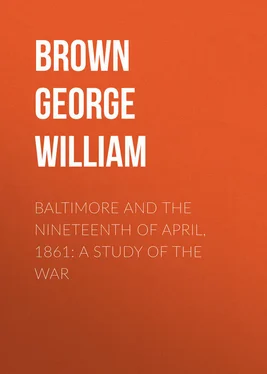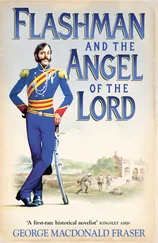George Brown - Baltimore and the Nineteenth of April, 1861 - A Study of the War
Здесь есть возможность читать онлайн «George Brown - Baltimore and the Nineteenth of April, 1861 - A Study of the War» — ознакомительный отрывок электронной книги совершенно бесплатно, а после прочтения отрывка купить полную версию. В некоторых случаях можно слушать аудио, скачать через торрент в формате fb2 и присутствует краткое содержание. ISBN: , Жанр: Историческая проза, foreign_antique, foreign_prose, foreign_language, на английском языке. Описание произведения, (предисловие) а так же отзывы посетителей доступны на портале библиотеки ЛибКат.
- Название:Baltimore and the Nineteenth of April, 1861: A Study of the War
- Автор:
- Жанр:
- Год:неизвестен
- ISBN:http://www.gutenberg.org/ebooks/39346
- Рейтинг книги:3 / 5. Голосов: 1
-
Избранное:Добавить в избранное
- Отзывы:
-
Ваша оценка:
- 60
- 1
- 2
- 3
- 4
- 5
Baltimore and the Nineteenth of April, 1861: A Study of the War: краткое содержание, описание и аннотация
Предлагаем к чтению аннотацию, описание, краткое содержание или предисловие (зависит от того, что написал сам автор книги «Baltimore and the Nineteenth of April, 1861: A Study of the War»). Если вы не нашли необходимую информацию о книге — напишите в комментариях, мы постараемся отыскать её.
Baltimore and the Nineteenth of April, 1861: A Study of the War — читать онлайн ознакомительный отрывок
Ниже представлен текст книги, разбитый по страницам. Система сохранения места последней прочитанной страницы, позволяет с удобством читать онлайн бесплатно книгу «Baltimore and the Nineteenth of April, 1861: A Study of the War», без необходимости каждый раз заново искать на чём Вы остановились. Поставьте закладку, и сможете в любой момент перейти на страницу, на которой закончили чтение.
Интервал:
Закладка:
It was clear that the knowledge of a treasonable conspiracy of such vast proportions, which had already begun its operations, ought not to be confined solely to the keeping of Mr. Felton and Miss Dix. Mr. N. P. Trist, an officer of the road, was accordingly admitted into the secret, and was dispatched in haste to Washington, to lay all the facts before General Scott, the Commander-in-Chief. The General, however, would give no assurances except that he would do all he could to bring sufficient troops to Washington to make it secure. Matters stood in this unsatisfactory condition for some time, until a new rumor reached the ears of Mr. Felton.
A gentleman from Baltimore, he says, came out to Back River Bridge, about five miles east of the city, and told the bridgekeeper that he had information which had come to his knowledge, of vital importance to the road, which he wished communicated to Mr. Felton. The nature of this communication was that a party was then organized in Baltimore to burn the bridges in case Mr. Lincoln came over the road, or in case an attempt was made to carry troops for the defense of Washington. The party at that time had combustible materials prepared to pour over the bridges, and were to disguise themselves as negroes and be at the bridge just before the train in which Mr. Lincoln travelled had arrived. The bridge was then to be burned, the train attacked, and Mr. Lincoln to be put out of the way. The man appeared several times, always, it seems, to the bridgekeeper, and he always communicated new information about the conspirators, but he would never give his name nor place of abode, and both still remain a mystery. Mr. Felton himself then went to Washington, where he succeeded in obtaining from a prominent gentleman from Baltimore whom he there saw, the judicious advice to apply to Marshal Kane, the Chief of Police in Baltimore, with the assurance that he was a perfectly reliable person. Marshal Kane was accordingly seen, but he scouted the idea that there was any such thing on foot as a conspiracy to burn the bridges and cut off Washington, and said he had thoroughly investigated the whole matter, and there was not the slightest foundation for such rumors. Mr. Felton was not satisfied, but he would have nothing more to do with Marshal Kane. He next sent for a celebrated detective in the West, whose name is not given, and through this chief and his subordinates every nook and corner of the road and its vicinity was explored. They reported that they had joined the societies of the conspirators in Baltimore and got into their secrets, and that the secret working of secession and treason was laid bare, with all its midnight plottings and daily consultations. The conspiracy being thus proved to Mr. Felton's satisfaction, he at once organized and armed a force of two hundred men and scattered them along the line of the railroad between the Susquehanna and Baltimore, principally at the bridges. But, strange to say, all that was accomplished by this formidable body was an enormous job of whitewashing.
The narrative proceeds: "These men were drilled secretly and regularly by drill-masters, and were apparently employed in whitewashing the bridges, patting on some six or seven coats of whitewash saturated with salt and alum, to make the outside of the bridges as nearly fireproof as possible. This whitewashing, so extensive in its application, became (continues Mr. Felton) the nine days' wonder of the neighborhood." And well it might. After the lapse of twenty-five years the wonder over this feat of strategy can hardly yet have ceased in that rural and peaceful neighborhood. But, unfortunately for Mr. Felton's peace of mind, the programme of Mr. Lincoln's journey was suddenly changed. He had selected a different route. He had decided to go to Harrisburg from Philadelphia, and thence by day to Baltimore, over another and a rival road, known as the Northern Central. Then the chief detective discovered that the attention of the conspirators was suddenly turned to the Northern Central road. The mysterious unknown gentleman from Baltimore appeared again on the scene and confirmed this statement. He gave warning that Mr. Lincoln was to be waylaid and his life sacrificed on that road, on which no whitewash had been used, and where there were no armed men to protect him.
Mr. Felton hurried to Philadelphia, and there, in a hotel, joined his chief detective, who was registered under a feigned name. Mr. Lincoln, cheered by a dense crowd, was, at that moment, passing through the streets of Philadelphia. A sub-detective was sent to bring Mr. Judd, Mr. Lincoln's intimate friend, to the hotel to hold a consultation. Mr. Judd was in the procession with Mr. Lincoln, but the emergency admitted no delay. The eagerness of the sub-detective was so great that he was three times arrested and carried out of the crowd by the police before he could reach Mr. Judd. The fourth attempt succeeded, and Mr. Judd was at last brought to the hotel, where he met both Mr. Felton and the chief detective. The narrative then proceeds in the words of Mr. Felton: "We lost no time in making known to him (Mr. Judd) all the facts which had come to our knowledge in reference to the conspiracy, and I most earnestly advised sleeping-car. Mr. Judd fully entered into the plan, and said he would urge Mr. Lincoln to adopt it. On his communicating with Mr. Lincoln, after the services of the evening were over, he answered that he had engaged to go to Harrisburg and speak the next day, and that he would not break his engagement, even in the face of such peril, but that after he had fulfilled his engagement he would follow such advice as we might give him in reference to his journey to Washington." Mr. Lincoln accordingly went to Harrisburg the next day and made an address. After that the arrangements for the journey were shrouded in the profoundest mystery. It was given out that he was to go to Governor Curtin's house for the night, but he was, instead, conducted to a point about two miles out of Harrisburg, where an extra car and engine waited to take him to Philadelphia. The telegraph lines east, west, north and south from Harrisburg were cut, so that no message as to his movements could be sent off in any direction. But all this caused a detention, and the night train from Philadelphia to Baltimore had to be held back until the arrival of Mr. Lincoln at the former place. If, however, the delay proved to be considerable, when Mr. Lincoln reached Baltimore the connecting train to Washington might leave without him. But Mr. Felton was equal to the occasion. He devised a plan which was communicated to only three or four on the road. A messenger was sent to Baltimore by an earlier train to say to the officials of the Washington road that a very important package must be delivered in Washington early in the morning, and to request them to wait for the night train from Philadelphia. To give color to this statement, a package of old railroad reports, done up with great care, and with a large seal attached, marked by Mr. Felton's own hand, "Very Important," was sent in the train which carried Mr. Lincoln on his famous night ride from Philadelphia through Maryland and Baltimore to the city of Washington. The only remarkable incident of the journey was the mysterious behavior of the few officials who were entrusted with the portentous secret.
I do not know how others may be affected by this narrative, but I confess even now to a feeling of indignation that Mr. Lincoln, who was no coward, but proved himself on many an occasion to be a brave man, was thus prevented from carrying out his original intention of journeying to Baltimore in the light of day, in company with his wife and children, relying as he always did on the honor and manhood of the American people. It is true we have, to our sorrow, learned by the manner of his death, as well as by the fate of still another President, that no one occupying so high a place can be absolutely safe, even in this country, from the danger of assassination, but it is still true that as a rule the best way to meet such danger is boldly to defy it.
Читать дальшеИнтервал:
Закладка:
Похожие книги на «Baltimore and the Nineteenth of April, 1861: A Study of the War»
Представляем Вашему вниманию похожие книги на «Baltimore and the Nineteenth of April, 1861: A Study of the War» списком для выбора. Мы отобрали схожую по названию и смыслу литературу в надежде предоставить читателям больше вариантов отыскать новые, интересные, ещё непрочитанные произведения.
Обсуждение, отзывы о книге «Baltimore and the Nineteenth of April, 1861: A Study of the War» и просто собственные мнения читателей. Оставьте ваши комментарии, напишите, что Вы думаете о произведении, его смысле или главных героях. Укажите что конкретно понравилось, а что нет, и почему Вы так считаете.












